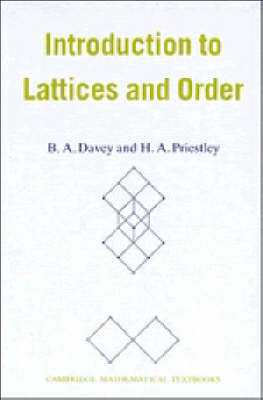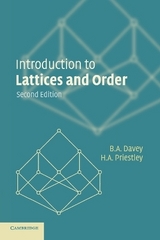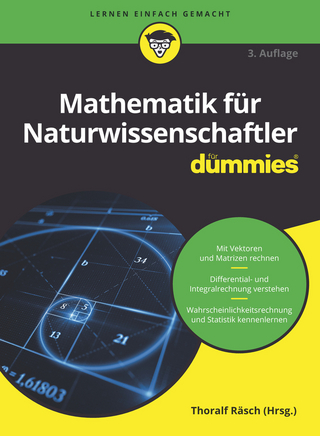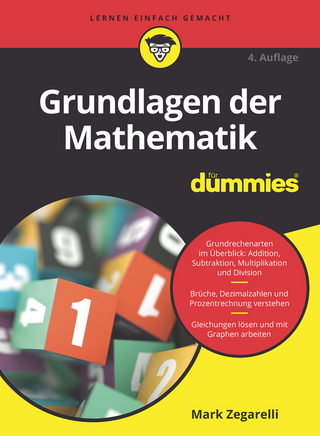
Introduction to Lattices and Order
Seiten
1990
Cambridge University Press (Verlag)
978-0-521-36766-0 (ISBN)
Cambridge University Press (Verlag)
978-0-521-36766-0 (ISBN)
- Titel erscheint in neuer Auflage
- Artikel merken
Zu diesem Artikel existiert eine Nachauflage
This book covers areas such as ordered sets, lattices, distributive lattices and Boolean algebras and it is intended to stress the interaction between ordered sets and lattices. The only prerequisite for students is exposure to elementary abstract algebra and the notation of set theory.
This is the first introductory textbook on ordered sets and lattices, and covers both the basic theory and its applications. The importance of ordered structures has been increasingly recognised in recent years due to an explosion of interest in computer science and all areas of discrete mathematics. The authors provide a thorough introduction to ordered sets, lattices, distributive lattices and Boolean algebras. Ordered sets, and in particular lattices, can be represented pictorially, and this key feature is emphasised throughout. Lattices are also considered as algebraic structures and their study from this viewpoint reinforces ideas encountered in the theory of groups and rings. The representation of distributive lattices by ordered topological spaces is presented; a self-contained treatment of the requisite topology is included. Two chapters are devoted to topics with application to computer science. These cover complete partial orders, domains (including their relation to information systems), and fixpoint theory. Another chapter deals with formal concept analysis - a new and important application of lattice theory of interest to mathematicians and social scientists. Prerequisites are minimal; all that is assumed is exposure to the notation of set theory and elementary abstract algebra. The numerous classroom-tested exercises will make the book especially useful for course accompaniment, but it will also be valuable as a background reference for mathematicians, logicians and computer scientists.
This is the first introductory textbook on ordered sets and lattices, and covers both the basic theory and its applications. The importance of ordered structures has been increasingly recognised in recent years due to an explosion of interest in computer science and all areas of discrete mathematics. The authors provide a thorough introduction to ordered sets, lattices, distributive lattices and Boolean algebras. Ordered sets, and in particular lattices, can be represented pictorially, and this key feature is emphasised throughout. Lattices are also considered as algebraic structures and their study from this viewpoint reinforces ideas encountered in the theory of groups and rings. The representation of distributive lattices by ordered topological spaces is presented; a self-contained treatment of the requisite topology is included. Two chapters are devoted to topics with application to computer science. These cover complete partial orders, domains (including their relation to information systems), and fixpoint theory. Another chapter deals with formal concept analysis - a new and important application of lattice theory of interest to mathematicians and social scientists. Prerequisites are minimal; all that is assumed is exposure to the notation of set theory and elementary abstract algebra. The numerous classroom-tested exercises will make the book especially useful for course accompaniment, but it will also be valuable as a background reference for mathematicians, logicians and computer scientists.
1. Ordered sets; 2. Special types of ordered set; 3. Lattices as algebraic structures; 4. Boolean algebras; 5. The structure of finite distributive lattices and finite Boolean algebras; 6. Ideals, filters, and congruences; 7. The Stone Representation Theorem for Boolean algebras; 8. Lattices in algebra; Appendix: outline of relevant basic topology.
| Erscheint lt. Verlag | 26.4.1990 |
|---|---|
| Zusatzinfo | Worked examples or Exercises |
| Verlagsort | Cambridge |
| Sprache | englisch |
| Maße | 153 x 228 mm |
| Gewicht | 415 g |
| Themenwelt | Mathematik / Informatik ► Mathematik ► Allgemeines / Lexika |
| Mathematik / Informatik ► Mathematik ► Algebra | |
| ISBN-10 | 0-521-36766-2 / 0521367662 |
| ISBN-13 | 978-0-521-36766-0 / 9780521367660 |
| Zustand | Neuware |
| Haben Sie eine Frage zum Produkt? |
Mehr entdecken
aus dem Bereich
aus dem Bereich



